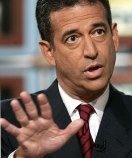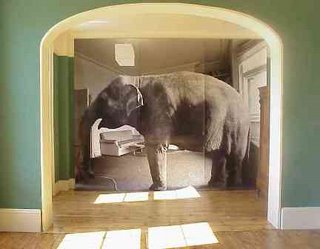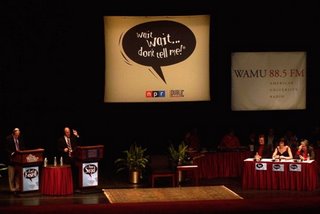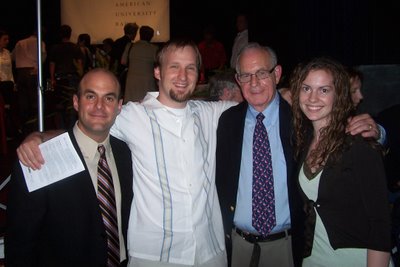
Senator Cantwell's Knee High Black Boots: I once saw Senator Maria Cantwell strut through the Capitol sporting a leather skirt and knee high black boots. While admittedly not THAT racy... they certainly weren't your stereotypical Senatorial footwear. Stereotypical Secretary of State footwear maybe... but not Senatorial footwear.
 Getting Tough Guy'ed By Senator Feingold: I once had to stop abruptly before boarding an elevator in the Capitol because someone cut in front of me. The problem was that Senator Russ Feingold was rushing past right behind me. After practically leveling me with his right shoulder, he shot me a nasty scowled and muttered something unintelligible under his breath. I began apologizing profusely, but he paid me no mind. He simply exchanged a terse glance with the aide who he was with and went on his way.
Getting Tough Guy'ed By Senator Feingold: I once had to stop abruptly before boarding an elevator in the Capitol because someone cut in front of me. The problem was that Senator Russ Feingold was rushing past right behind me. After practically leveling me with his right shoulder, he shot me a nasty scowled and muttered something unintelligible under his breath. I began apologizing profusely, but he paid me no mind. He simply exchanged a terse glance with the aide who he was with and went on his way. Senator Obama Outing the "Elephant in the Room": Each week the Democratic Policy Committee puts together a policy luncheon for the Democratic Caucus. It typically features a high profile guest speaker discussing a current political issue. Anywhere from a dozen to several dozen Democratic Senators attend, depending on who the guest speaker is. The most well-attended luncheon I participated in was headlined by Author and Pastor Rick Warren. He's a moderate evangelical preacher that, in addition to many of the usual conservative social causes, also champions climate control, human rights, and governmental programs to aid the poor. Warren spoke at length on these topics and then took questions from the Senators. The discussion tip-toed around the most contentious social issues until Senator Barack Obama raised his hand and, after graciously thanking Warren for his presentation, said "I think everyone is aware that there's an elephant in the room here. I'd like to hear your thoughts abortion and gay marriage." A little startled, Warren went on to recommend that those who supported either abortion or gay marriage not try and force their positions on evangelical voters (who were not likely to be persuaded), but instead focus on whatever common ground they may share with these voters. In the end it was refreshing to see Obama go out of his way to cut the crap.
Senator Obama Outing the "Elephant in the Room": Each week the Democratic Policy Committee puts together a policy luncheon for the Democratic Caucus. It typically features a high profile guest speaker discussing a current political issue. Anywhere from a dozen to several dozen Democratic Senators attend, depending on who the guest speaker is. The most well-attended luncheon I participated in was headlined by Author and Pastor Rick Warren. He's a moderate evangelical preacher that, in addition to many of the usual conservative social causes, also champions climate control, human rights, and governmental programs to aid the poor. Warren spoke at length on these topics and then took questions from the Senators. The discussion tip-toed around the most contentious social issues until Senator Barack Obama raised his hand and, after graciously thanking Warren for his presentation, said "I think everyone is aware that there's an elephant in the room here. I'd like to hear your thoughts abortion and gay marriage." A little startled, Warren went on to recommend that those who supported either abortion or gay marriage not try and force their positions on evangelical voters (who were not likely to be persuaded), but instead focus on whatever common ground they may share with these voters. In the end it was refreshing to see Obama go out of his way to cut the crap. "Bouncing" Senator Mikulski: At the aforementioned policy luncheons I was sometimes asked to stand as a bouncer at the entrance of the Lyndon B. Johnson room in which the luncheons were typically held. The only people allowed at the luncheons (outside of the DPC staffers putting it on) were the Senators, the speaker, and, occasionally, some high-level Senate staff. Since unauthorized people often attempted to come, I was supposed to be vigilant as the doorman. Problem is, that while I know all 44 Democratic Senators by name, I can't claim to know what they all look like. So my strategy, if I didn't recognize someone, was to simply let them pass if they seemed like they could be a Senator. If they looked like I thought a Senator might and approached confidently, I usually just said hello and let them through. This generally was pretty effective. Except for once. The first time I was asked to "bounce" I began hesitantly. But after correctly identifying about 6 or 7 Senators, I got a little over-confident. So when a very short (4'11") and somewhat stout and frumpy woman approached me, I didn't think twice about asking her what her name was. In all honesty, with a hair net and an apron she could have passed for a lunch lady. Without slowing down, she gruffly said "I'm a United States Senator. Mikulski. I'm on the list." And then she blew right past me. I wasn't really much for "bouncing" after that.
"Bouncing" Senator Mikulski: At the aforementioned policy luncheons I was sometimes asked to stand as a bouncer at the entrance of the Lyndon B. Johnson room in which the luncheons were typically held. The only people allowed at the luncheons (outside of the DPC staffers putting it on) were the Senators, the speaker, and, occasionally, some high-level Senate staff. Since unauthorized people often attempted to come, I was supposed to be vigilant as the doorman. Problem is, that while I know all 44 Democratic Senators by name, I can't claim to know what they all look like. So my strategy, if I didn't recognize someone, was to simply let them pass if they seemed like they could be a Senator. If they looked like I thought a Senator might and approached confidently, I usually just said hello and let them through. This generally was pretty effective. Except for once. The first time I was asked to "bounce" I began hesitantly. But after correctly identifying about 6 or 7 Senators, I got a little over-confident. So when a very short (4'11") and somewhat stout and frumpy woman approached me, I didn't think twice about asking her what her name was. In all honesty, with a hair net and an apron she could have passed for a lunch lady. Without slowing down, she gruffly said "I'm a United States Senator. Mikulski. I'm on the list." And then she blew right past me. I wasn't really much for "bouncing" after that. Bringing Jäger to Work: Yup. That's right. Believe it or not, dogs are allowed in the Congressional office buildings. Security hassles you more if you have nail clippers in your pocket than if you've got yourself a dog. Rumor has it that Senator Kennedy likes to bring his to the office a lot. Me... I only brought Jäg' on a couple of occasions, but memorable experiences they were. It really didn't take him long to feel at home. He quickly settled in and did a great job of continually distracting just about everyone in the office. I'm certain he had a measurable effect on our productivity while he was there... so basically he fit right in.
Bringing Jäger to Work: Yup. That's right. Believe it or not, dogs are allowed in the Congressional office buildings. Security hassles you more if you have nail clippers in your pocket than if you've got yourself a dog. Rumor has it that Senator Kennedy likes to bring his to the office a lot. Me... I only brought Jäg' on a couple of occasions, but memorable experiences they were. It really didn't take him long to feel at home. He quickly settled in and did a great job of continually distracting just about everyone in the office. I'm certain he had a measurable effect on our productivity while he was there... so basically he fit right in.







